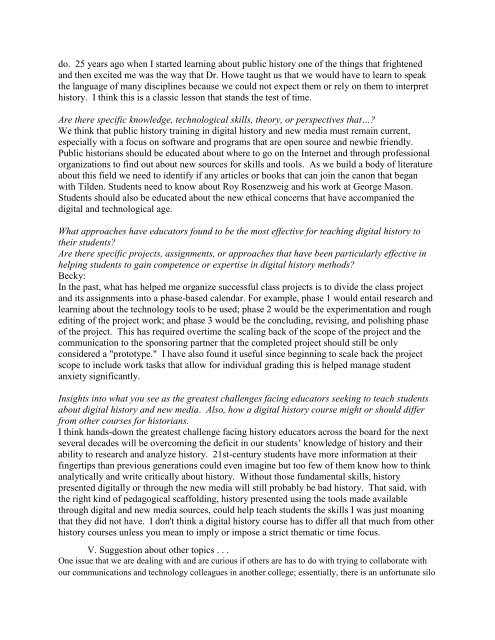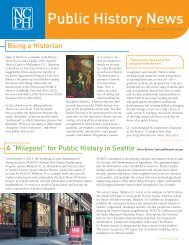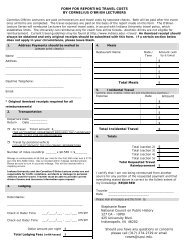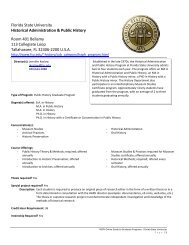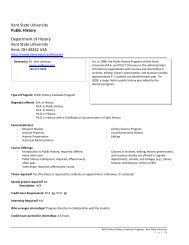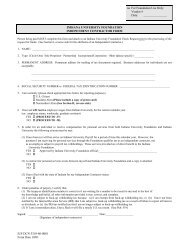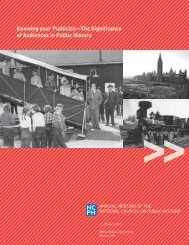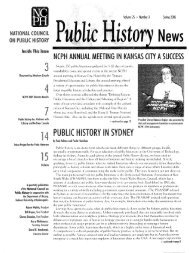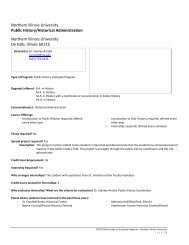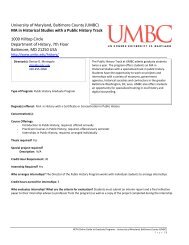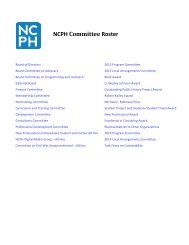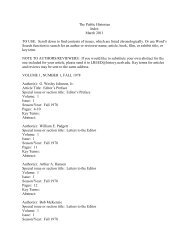Case Statement - National Council on Public History
Case Statement - National Council on Public History
Case Statement - National Council on Public History
Create successful ePaper yourself
Turn your PDF publications into a flip-book with our unique Google optimized e-Paper software.
do. 25 years ago when I started learning about public history <strong>on</strong>e of the things that frightened<br />
and then excited me was the way that Dr. Howe taught us that we would have to learn to speak<br />
the language of many disciplines because we could not expect them or rely <strong>on</strong> them to interpret<br />
history. I think this is a classic less<strong>on</strong> that stands the test of time.<br />
Are there specific knowledge, technological skills, theory, or perspectives that…?<br />
We think that public history training in digital history and new media must remain current,<br />
especially with a focus <strong>on</strong> software and programs that are open source and newbie friendly.<br />
<strong>Public</strong> historians should be educated about where to go <strong>on</strong> the Internet and through professi<strong>on</strong>al<br />
organizati<strong>on</strong>s to find out about new sources for skills and tools. As we build a body of literature<br />
about this field we need to identify if any articles or books that can join the can<strong>on</strong> that began<br />
with Tilden. Students need to know about Roy Rosenzweig and his work at George Mas<strong>on</strong>.<br />
Students should also be educated about the new ethical c<strong>on</strong>cerns that have accompanied the<br />
digital and technological age.<br />
What approaches have educators found to be the most effective for teaching digital history to<br />
their students?<br />
Are there specific projects, assignments, or approaches that have been particularly effective in<br />
helping students to gain competence or expertise in digital history methods?<br />
Becky:<br />
In the past, what has helped me organize successful class projects is to divide the class project<br />
and its assignments into a phase-based calendar. For example, phase 1 would entail research and<br />
learning about the technology tools to be used; phase 2 would be the experimentati<strong>on</strong> and rough<br />
editing of the project work; and phase 3 would be the c<strong>on</strong>cluding, revising, and polishing phase<br />
of the project. This has required overtime the scaling back of the scope of the project and the<br />
communicati<strong>on</strong> to the sp<strong>on</strong>soring partner that the completed project should still be <strong>on</strong>ly<br />
c<strong>on</strong>sidered a "prototype." I have also found it useful since beginning to scale back the project<br />
scope to include work tasks that allow for individual grading this is helped manage student<br />
anxiety significantly.<br />
Insights into what you see as the greatest challenges facing educators seeking to teach students<br />
about digital history and new media. Also, how a digital history course might or should differ<br />
from other courses for historians.<br />
I think hands-down the greatest challenge facing history educators across the board for the next<br />
several decades will be overcoming the deficit in our students’ knowledge of history and their<br />
ability to research and analyze history. 21st-century students have more informati<strong>on</strong> at their<br />
fingertips than previous generati<strong>on</strong>s could even imagine but too few of them know how to think<br />
analytically and write critically about history. Without those fundamental skills, history<br />
presented digitally or through the new media will still probably be bad history. That said, with<br />
the right kind of pedagogical scaffolding, history presented using the tools made available<br />
through digital and new media sources, could help teach students the skills I was just moaning<br />
that they did not have. I d<strong>on</strong>'t think a digital history course has to differ all that much from other<br />
history courses unless you mean to imply or impose a strict thematic or time focus.<br />
V. Suggesti<strong>on</strong> about other topics . . .<br />
One issue that we are dealing with and are curious if others are has to do with trying to collaborate with<br />
our communicati<strong>on</strong>s and technology colleagues in another college; essentially, there is an unfortunate silo


